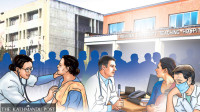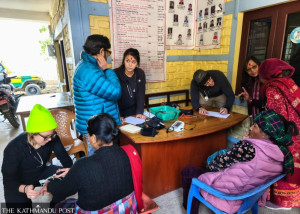Health
Dengue is spreading in various parts of country including Kathmandu
Health ministry officials say around two dozen dengue cases reported every week. Actual number could be higher.
Arjun Poudel
Amid soaring temperatures, dengue cases are being reported in various parts of the country. Officials at the Ministry of Health and Population said several local units including those in the Kathmandu Valley have reported dengue infections.
“We have alerted local units that have reported dengue cases to take preventive measures,” said Dr Gokarna Dahal, chief of the Vector Control Section at the Epidemiology and Disease Control Division. “Local units can launch awareness drives to alert the public about the risks.”
Dengue is a viral disease transmitted by female Aedes aegypti and Aedes albopictus mosquitoes. The same vectors also transmit chikungunya, yellow fever, and Zika virus, according to the World Health Organisation.
Last year, 20 persons died and more than 52,000 were infected by the virus, which had spread to all 77 districts. At the time, hospitals in Kathmandu Valley were overwhelmed with dengue patients and pharmacies had run out of paracetamol, the most widely used medicine to treat fever.
In 2022, 88 people died and over 54,000 were infected by the virus throughout the country.
In 2019, the disease killed at least six people and more than 16,000 were hospitalised across the country. The virus had spread to 68 districts at the time.
According to Dahal, cases of dengue infection have been reported from local units of the Kathmandu Valley also.
“Nearly two dozen cases are being reported every week,” said Dahal.
Public health experts say reported cases could be just the tip of the iceberg, as around 80 percent of people infected with the deadly virus do not show any symptoms. Many people infected with dengue show mild symptoms and do not need treatment or can be treated with paracetamol at home.
Experts say that this is the right time to start preparation to prevent possible outbreaks in the coming days.
“It will be too late if we wait for a massive outbreak,” said Dr Sher Bahadur Pun, chief of the Clinical Research Unit at the Sukraraj Tropical and Infectious Disease Hospital. “Authorities concerned should launch an awareness drive, step up vector surveillance and take other measures to cut the risk.”
Of late, dengue has become endemic in Nepal as cases are reported throughout the year. Epidemiologists as well as virologists said dengue virus has emerged as a major public health issue in Nepal. They also said that despite thousands of persons getting infected and scores dying from the disease, the authorities are yet to take it seriously.
They believe that this lackadaisical approach is responsible for the spread of the virus. What authorities concerned do most of the time is count the number of infections and deaths, according to them.
They said measures such as search-and-destroy and awareness drives should be initiated to contain the spread of virus-spreading vectors.
Dengue-transmitting mosquitoes breed in clean water and bite people in daylight. Uncovered water tanks and other discarded objects such as plastic cups and bottles could be breeding grounds for the dengue-carrying mosquitoes.
Symptoms of dengue include mild to high fever, severe muscle pain, rashes, severe headache and pain in the eyes, doctors say. Patients with these symptoms are advised to seek immediate treatment. While there is no specific cure for the disease, early detection and access to proper medical care can prevent death.




 11.12°C Kathmandu
11.12°C Kathmandu














